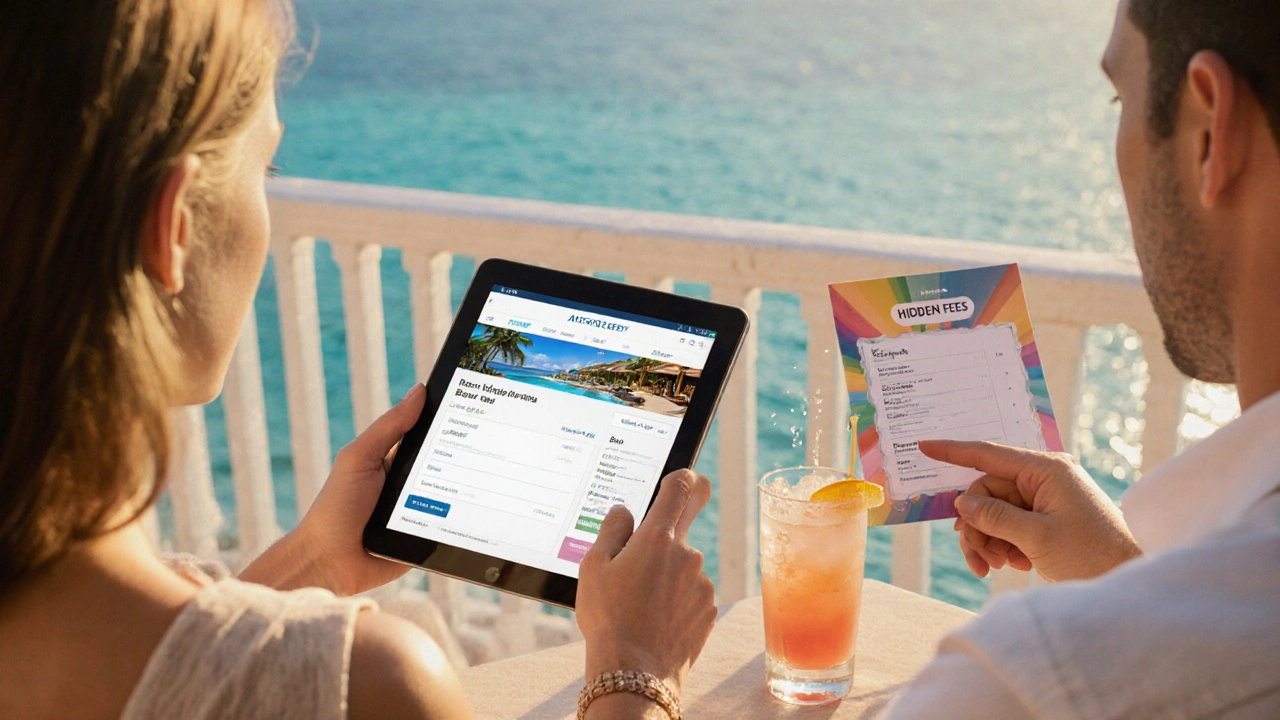All-Inclusive Hotel Savings Calculator
Calculate Your Potential Savings
Estimated Savings
Did you know that roughly 70% of travelers end up paying more than they planned for an all‑inclusive vacation? The good news is that you can keep the price low without sacrificing the beach, the pool, or the endless buffets.
When planning a beach getaway, all‑inclusive hotel is a lodging package that bundles rooms, meals, drinks, and many onsite activities into a single upfront price. This convenience traps many travelers into hidden costs-upcharges for premium drinks, extra‑theme nights, or "optional" excursions that aren’t truly optional. Knowing where the money leaks start is the first step to plugging them.
Understanding the Price Breakdown
Most all‑inclusive deals list a base price that covers standard meals and drinks. Anything beyond that-premium alcohol, spa treatments, specialty restaurants, or off‑property tours-usually carries a separate charge. Look for the line items "amenity surcharge" or "extra activity fee" in the fine print. Being aware of these items lets you decide beforehand whether you’ll use them or skip them.
Another sneaky expense is the travel budget. Travelers often set a daily allowance but forget to factor in taxes, resort fees, and optional night‑time entertainment. Write down every expected cost before you book, then compare it to the advertised all‑inclusive price.
Timing Your Booking for Maximum Savings
Seasonality is the biggest lever. Booking during the off‑season (usually late autumn or early spring for Caribbean destinations) can shave 30% off the headline price. Early‑bird specials, which appear 6‑9 months before the travel date, often include extra credits for drinks or free room upgrades.
On the flip side, last‑minute deals can work if you’re flexible with dates and room type. Some resorts slash prices 20%-40% in the final week to fill empty inventory. Set up price alerts on a trusted travel agency platform and act quickly when the alert drops.

Where to Book: Direct, OTA, or Agent?
Where you buy the package matters. Direct booking through the resort’s own website often gives you the lowest base price and the most generous cancellation policy. However, online travel agencies (OTAs) like Expedia or Booking.com sometimes bundle extra perks-airport transfers, resort credits, or free Wi‑Fi-that can offset a slightly higher price.
Travel agents specializing in all‑inclusive vacations may have access to closed‑group rates unavailable to the public. If you belong to a loyalty program, you might earn points toward future stays. Below is a quick comparison of the most common booking channels.
| Channel | Typical Discount | Extra Perks | Flexibility |
|---|---|---|---|
| Direct Hotel Website | 5%-10% | Free room upgrade, resort credit | High (usually free cancellation up to 48hrs) |
| Online Travel Agency (OTA) | 10%-15% | Airport transfer, free Wi‑Fi | Medium (cancellation fees may apply) |
| Travel Agent | 15%-25% | Exclusive excursions, meal vouchers | Variable (depends on contract) |
| Loyalty Program | 5%-20% via points redemption | Priority check‑in, complimentary minibar | High (points can be re‑deposited) |
Cutting Costs While You’re On‑Site
Even after you lock in a discounted rate, daily spending can add up. Here are practical ways to keep the bill low without missing out:
- Mind the drink menu. Most all‑inclusive resorts offer a standard open bar. Premium wines, top‑shelf spirits, and specialty coffees usually cost extra. Stick to the house brands or drink water from the tap (most hotels provide filtered water stations).
- Skip the paid excursions. Many resorts partner with local tour operators and include day trips in the package. Ask the concierge for a list of "included" activities before you book a separate tour.
- Tip wisely. While tipping is appreciated, it’s not mandatory at most all‑inclusive properties. A small gratuity for exceptional service (e.g., $1‑2 per drink) balances politeness with budget control.
- Use the on‑site currency exchange. If you need local cash, exchange a small amount at a bank before you travel. Resort exchange desks often charge a 5%‑10% markup, which can be avoided with a pre‑loaded travel card.
Another hidden money‑saver is the package deal that bundles your flight, transfers, and resort stay. Compare the total cost of a bundled quote against booking each component separately. In many cases, bundles win because airlines and hotels share the savings.
Smart Money Hacks Outside the Resort
Saving money doesn’t stop at the hotel front desk. Consider these broader strategies:
- Travel insurance with “cancellation for any reason” (CFAR) coverage. It sounds pricey, but a $30 CFAR policy can protect a $1,500 all‑inclusive booking if your plans change.
- Credit‑card travel rewards. Some cards give 2‑3 points per dollar spent on travel purchases. Redeem points for statement credits to offset the final bill.
- Currency‑friendly credit cards. Choose a card with no foreign transaction fees. Even a 1% fee on a $2,000 spend adds up to $20.
- Local grocery stores. If your resort has a kitchenette or allows food storage, buying snacks or breakfast items locally can shave $10‑$15 per day.
Sample Budget: 7‑Day All‑Inclusive Trip to Jamaica
Below is a realistic breakdown for a couple traveling off‑season, using an early‑bird direct‑booking rate.
- Base all‑inclusive package (2 rooms, 7 nights): $2,200
- Airport transfer (included via OTA perk): $0
- Premium drink surcharge (2 drinks per day × $8 × 7 days): $112
- Optional excursion (snorkeling tour, not included): $150
- Travel insurance (CFAR): $45
- Credit‑card reward rebate (2% of $2,507 total): -$50
- Total out‑of‑pocket: $2,467
By booking during the low‑season and using a credit‑card rebate, the couple saved over $300 compared to a peak‑season price of $2,800.
Key Takeaways
- Check the fine print for premium‑drink and activity fees.
- Travel off‑season or grab early‑bird specials for the biggest discount.
- Compare direct hotel sites, OTAs, travel agents, and loyalty programs.
- Limit extra spending by using the standard bar, choosing included excursions, and tipping modestly.
- Leverage travel insurance, credit‑card rewards, and no‑fee cards for extra savings.
Frequently Asked Questions
Can I get a refund if I cancel a last‑minute all‑inclusive booking?
Cancellation policies vary by resort and booking channel. Direct bookings usually allow free cancellation up to 48hours before arrival, while OTA or agent bookings often charge a 20%‑30% fee. Always read the cancellation clause before you pay.
Are all drinks really included in an all‑inclusive package?
Standard beers, house wines, and basic spirits are usually covered. Premium brands, top‑shelf liquors, and specialty coffees often cost extra. Look for a "premium drink surcharge" in the resort’s menu.
Is it worth using a travel agent for an all‑inclusive vacation?
If you value personalized service and access to closed‑group rates, a travel agent can save you 15%‑25% compared to public rates. However, self‑service via a reputable OTA can be just as cheap if you’re comfortable researching yourself.
What are the best destinations for inexpensive all‑inclusive stays?
Look to the Dominican Republic, Mexico’s Riviera Maya, and certain Caribbean islands like the Bahamas' less‑touristy spots. Off‑season visits to these areas often deliver the lowest per‑night rates.
How can I avoid the resort’s currency exchange markup?
Exchange a modest amount at your home bank before you leave, or use a no‑fee travel debit card that draws directly from your home currency at the local rate.
